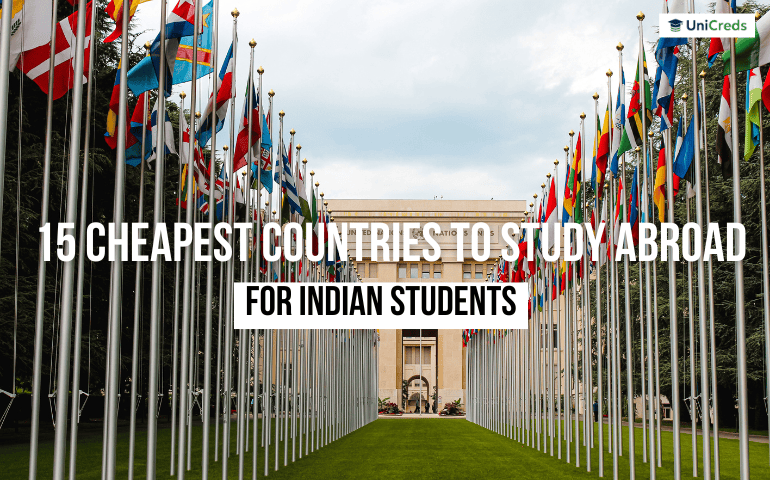Table of Contents
Canada has become a prominent destination for international students seeking quality education, cultural diversity, and a welcoming environment.
In 2023, Canada hosted over 1 million international students, a 29% increase from the previous year.
This surge underscores Canada’s growing appeal as a study destination, offering a wide array of academic opportunities and a multicultural experience.
With its world-renowned educational institutions and a society that embraces diversity, Canada provides a unique and enriching experience for students from around the globe.
About Studying Abroad in Canada
The Canadian education system is a world leader in the field of research while remaining accessible and diverse at the same time.
If you compare the Canadian education system to other higher education systems, Canadian degree programs may seem more flexible and manageable.
No matter which degree you go for, students are given a choice when selecting subjects. Consequently, Canadian students have more command over their workload and what subjects they wish to study, depending on the discipline.
Getting to Know the Education System
Canada is a well-known destination for various students, given its distinct programmes, free education, and its culture and history.
Talented individuals from all over the globe are attracted to Canada for its diversity, renowned education system, and cosmopolitan cities.
Canada offers an extensive range of degree programs in a number of specialities and disciplines.
Also, almost every program is taught in English, which gives a variety of choices for native speakers and the opportunity to practice for non-native speakers who wish to polish their skills.
Why Choose Canada for Education?
Canada has long been a favoured destination for international students, attracting individuals from across the globe with its promise of quality education and diverse cultural experiences.
The country’s appeal is rooted in several key factors contributing to a well-rounded and enriching academic journey.
- World-Class Education: Canadian colleges and universities are globally recognised for their high academic standards and innovative research. With over 100 universities and colleges offering more than 15,000-degree courses, students have a plethora of options to choose from.
- Multicultural Environment: Canada’s multicultural environment offers international students a unique opportunity to learn from different perspectives and cultures. This exposure enhances their educational experience and prepares them for a globalised world.
- Affordable Education: Canada offers relatively lower tuition fees compared to other English-speaking countries, making it an attractive and affordable study destination.
- Quality of Life: Canada consistently ranks high in terms of quality of life, offering a safe, clean, and welcoming environment for international students.
Key Requirements for International Students
Understanding the key requirements is crucial for international students aspiring to study in Canada.
These encompass academic qualifications, language proficiency, and the necessary permits and visas.
- Academic Requirements: International students must have completed their secondary education or its equivalent to be considered for admission into a Canadian university or college in 2025. A high school diploma or certificate and transcripts from previous educational institutions are generally required.
- Language Proficiency: As Canada is an English and French-speaking country, international students must demonstrate proficiency in either language. Most universities and colleges require students to take an English language test, such as the International English Language Testing System (IELTS) or the Test of English as a Foreign Language (TOEFL). The minimum scores vary depending on the institution and programme.
- Study Permit: A study permit is a document issued by the Canadian government that allows international students to study at a designated learning institution in Canada. To obtain a study permit, students must be accepted by a Canadian institution and provide proof of their financial ability to support their studies and living expenses. You should apply for a Canadian study permit at least one year before the intended start date.
Application Process
The application process for international students can be intricate, but it can be managed effectively with careful planning.
- Choosing a Designated Learning Institution (DLI): The first step is identifying and selecting a DLI that accepts international students. Factors such as location, specialisation, and programme offerings should be considered.
- Preparing for Proficiency Tests: Prior to arriving in Canada, international students must demonstrate their proficiency in either English or French. Researching the specific language proficiency test required by the institution is crucial.
- Applying for a Study Permit: After selecting a college or university, the next step is to apply for admission to a university in Canada. Each institution has distinct guidelines for its application process. International students should apply for their Canadian study permit well in advance.
The Exceptionally Friendly Culture of the Country
Canada is popular for being an open and progressive country that captivates millions of international students from all over the globe to study in Canada.
It’s not difficult to understand why! With free healthcare, a not-very-expensive cost of living, and a lot of options to explore, Canada is a dream destination for both urbanites and nature lovers.
There’s a plethora of hiking, skiing, and several other outdoor activities, as well as trendy metropolitan cities where you can always spend and enjoy the weekend.
Blending the best of American, European, and its own native cultures, Canada personifies a wonderful mix of cultures that it positively calls its own.
Cost of Living
Understanding the cost of living is essential for international students studying in Canada in 2025. The cost varies depending on the city and lifestyle choices.
- Accommodation: Accommodation is typically the most significant expense for international students. Costs can range from $500 to $1500 per month for a shared or private apartment, depending on the city. On-campus housing may be a more affordable option at some universities.
- Food: The cost of food can vary depending on dietary habits and preferences. On average, students can expect to spend between $200 and $400 per month on groceries.
- Transportation: Transportation costs depend on the city and mode of transport. Many cities offer student discounts on public transport.
- Other Expenses: Additional expenses include textbooks, school supplies, phone bills, and entertainment.
Adjusting to Life in Canada
Settling into a new country can be challenging, but with the right approach, international students can adapt and thrive in Canada.
- Embrace the Culture: Canada is known for its multiculturalism and welcoming atmosphere. Embrace the opportunity to learn about different cultures and make friends from around the world.
- Get Involved: Joining clubs, sports teams, or volunteer organisations can help students connect with others and feel more integrated into the community.
- Seek Support: Universities and colleges offer a range of support services for international students, including academic advising, counselling, and career services.
Immigration Trends and Statistics
In 2022/2023, international students accounted for 21.2% of all college and university enrolments.
- Growth in Numbers: The number of international students more than doubled from 199,116 in 2013/2014 to 468,087 in 2022/2023. This growth is driven by Canada’s reputation for quality education and its welcoming immigration policies.
- Diversity: While students from India and China have historically dominated the international student population, there is a growing trend towards greater diversity. In 2023, the fastest-growing student population came from African countries such as Guinea and Ghana.
- Regional Distribution: Ontario hosts the largest proportion of international students in Canada, accounting for 52% of all international students in 2023. This is due to the high number of educational institutions in the province.
Impact of New Visa Policies
The Canadian government has recently introduced new student visa policies that may impact the international student sector. These policies aim to ensure international students attend reputable institutions and have the resources to support themselves.
- Application Cap: The new policies include a cap on the number of international students accepted into Canada. This cap will be implemented based on provincial population levels.
- Potential Changes: The new policies may decrease the number of international students, particularly in provinces like Ontario. Institutions may also be disincentivised from accepting applications from countries with historically low approval rates.
The Future of International Education in Canada
Despite the potential challenges posed by the new visa policies, Canada remains an attractive destination for international students. The country’s commitment to quality education, multiculturalism, and a high quality of life will continue to draw students from around the world.
- Adaptation and Innovation: Canadian institutions will need to adapt to the changing landscape by diversifying their recruitment strategies and focusing on attracting students from a wider range of countries.
- Continued Growth: While the rate of growth may slow, the overall number of international students in Canada is expected to remain high. Canada’s reputation as a welcoming and inclusive society will continue to make it a popular choice for students seeking a world-class education.
Tips for Success
To make the most of their study abroad experience in Canada, international students should keep the following tips in mind:
- Plan Ahead: Start the application process early to allow ample time for visa processing and other preparations.
- Network: Connect with other international students and local Canadians to build a support network.
- Get Involved: Participate in extracurricular activities and volunteer opportunities to enhance the university experience.
- Stay Informed: Keep up-to-date with changes in immigration policies and other relevant information.
- Seek Help: Don’t hesitate to reach out to university support services for assistance with academic or personal issues.
Make Your Education Dream a Reality With UniCreds
Pursuing education abroad is a significant investment, and financing it can be a hurdle. Thankfully, platforms like UniCreds offer tailored abroad education loan solutions to help students achieve their academic dreams.
UniCreds makes getting education funding hassle-free with expert help and easy-to-use tools. Explore how UniCreds can help you achieve your educational goals!
FAQs
1. Why should I choose Canada for my education?
Canada offers world-class education with globally recognised colleges and universities. It boasts a multicultural environment, relatively affordable tuition fees compared to other English-speaking countries, and a high quality of life, making it a safe and welcoming environment for international students.
2. What are the key requirements for international students?
You’ll need to meet academic requirements (typically a high school diploma or equivalent), demonstrate language proficiency in English or French (usually through tests like IELTS or TOEFL), and obtain a study permit from the Canadian government.
3. How do I apply for a study permit?
First, choose a Designated Learning Institution (DLI) and get accepted. Then, gather the required documents and apply for the study permit well in advance of your intended start date. The application process can be intricate, so plan carefully.
4. How can I adjust to life in Canada?
Embrace the multicultural environment, get involved in clubs or activities, and seek support from university services. Canada is known for its welcoming atmosphere, so take advantage of the opportunity to connect with others and build a support network.










0 Comments